What Makes a Great Therapy Dog?
Several characteristics can make a dog a good candidate for therapy work. Some of the key traits of a great therapy dog include the following:
These traits can help a dog excel in therapy work and bring joy and comfort to those in need of therapeutic support.
Reasons for Having A Therapy Dog!
There are multiple reasons why people may choose to have a therapy dog. Some common reasons include the following:
Having a therapy dog can bring a sense of joy, comfort, and purpose to the lives of both the dog and the people they serve. Therapy dogs can provide a source of love and companionship and help individuals feel more connected and engaged in their communities.
Different Types of Therapy Dogs
Several different types of therapy dogs can provide various services to individuals in need of therapeutic support. Some of the different types of therapy dogs include:
Many benefits can be derived from therapy dogs. Some of how therapy dogs can be beneficial include:
Therapy dogs can provide a wide range of benefits to individuals, and they can be an invaluable source of support and comfort in times of need.
Therapy dogs, along with service dogs, and emotional support dogs all serve different purposes and have different roles in providing support and assistance to individuals. Here is a brief overview of the differences between these types of dogs:
All of these types of dogs can be valuable sources of support and assistance to individuals, but it is very important to understand the differences between them and to respect the roles and responsibilities of each type of dog.
Now that you have learned all about what therapy dogs are and what they do, below is our list of the most popular dog breeds used for therapy. Many dog breeds are well-suited to be therapy dogs. This is just a list of the 31 most popular breeds used for therapy dogs.
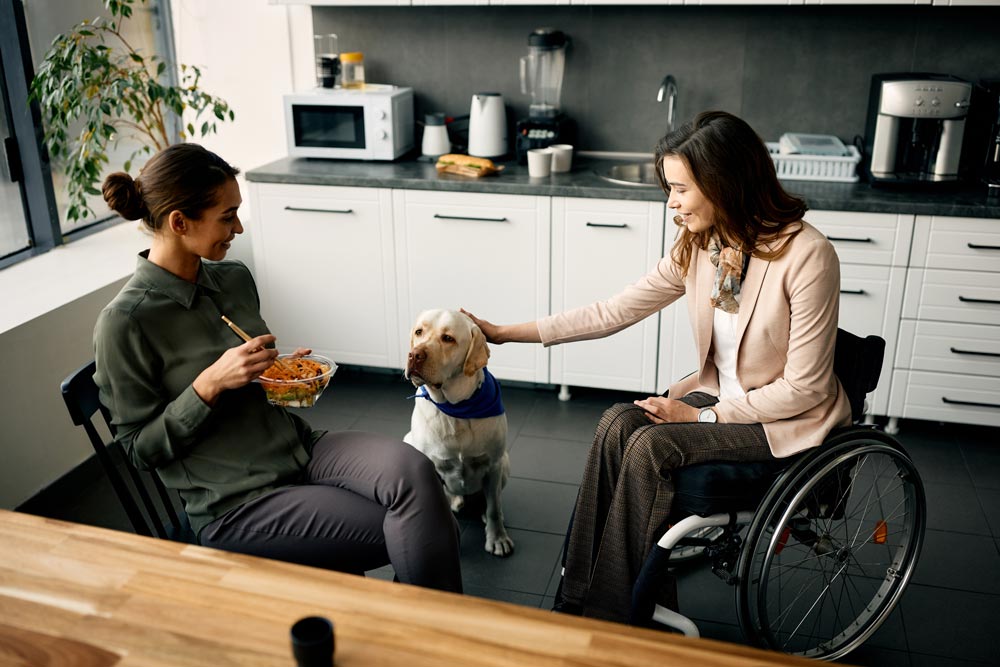
Labrador Retrievers are often used as therapy dogs due to their intelligence, outgoing personalities, and natural desire to please. They are gentle, patient, and have a calm disposition, making them well-suited for work with children and the elderly. Labradors are also very social and love being around people, which makes them a great choice for visiting hospitals, nursing homes, and other facilities where they can provide comfort and companionship. Additionally, Labradors are highly trainable and eager to learn, which makes them easy to work with and train for therapy work. Overall, Labrador Retrievers are a fantastic breed for therapy work due to their friendly, loving, and calming presence. Learn more about Black Labrador Retrievers, Chocolate Labrador Retrievers, Yellow Labrador Retrievers, Silver Labrador Retrievers, and Fox Red Labrador Retrievers.

Golden Retrievers are often used as therapy dogs due to their intelligence, gentle nature, and patient demeanor. They are very social and love being around people, which makes them a great choice for visiting hospitals, nursing homes, and other facilities where they can provide comfort and companionship. Golden Retrievers are also highly trainable and eager to please, making them easy to work with and train for therapy work. Additionally, they have a calm and patient disposition, which makes them well-suited for work with children and the elderly. Overall, Golden Retrievers are a fantastic breed for therapy work due to their friendly, loving, and calming presence. Learn more about Golden Retievers, and English Cream Golden Retrievers.
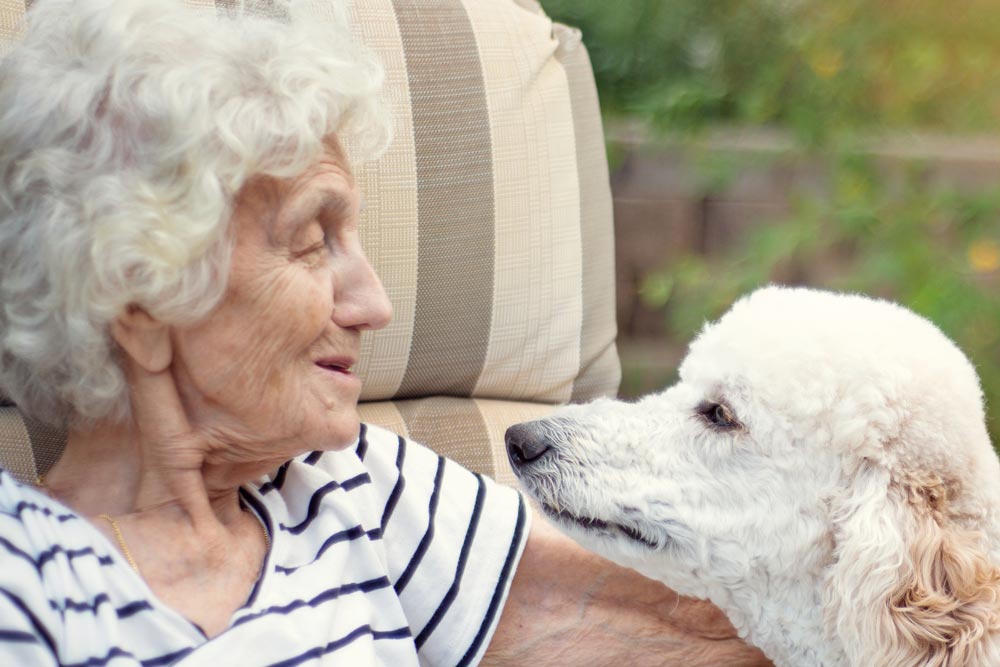
Poodles are often used as therapy dogs due to their intelligence, trainability, and strong desire to please their owners. They are gentle, patient, and have a calm disposition, making them well-suited for work with children and the elderly. Poodles are also highly social and love being around people, which makes them a great choice for visiting hospitals, nursing homes, and other facilities where they can provide comfort and companionship. Additionally, Poodles are highly trainable and eager to learn, which makes them easy to work with and train for therapy work. Overall, Poodles are a fantastic breed for therapy work due to their friendly, loving, and calming presence. Learn more about Standard Poodles, Miniature Poodles, and Toy Poodles.
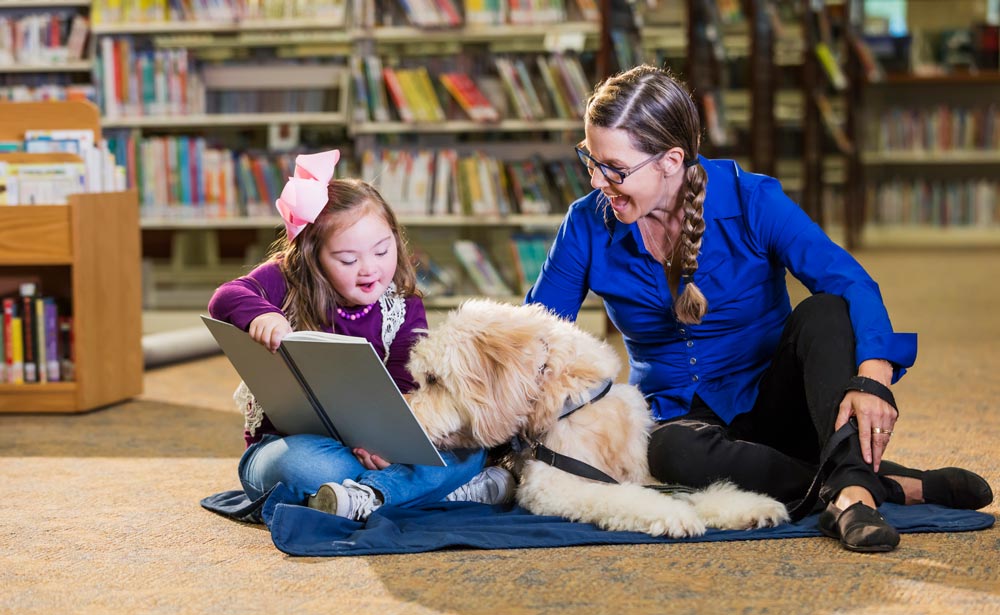
Goldendoodles are often used as therapy dogs due to their intelligence, gentle nature, and patient demeanor. This popular breed is a cross between a Golden Retriever and a Poodle and inherits many of the positive qualities of both breeds. Goldendoodles are highly social and love being around people, which makes them a great choice for visiting hospitals, nursing homes, and other facilities where they can provide comfort and companionship. They are also highly trainable and eager to please, making them easy to work with and train for therapy work. Additionally, Goldendoodles have a calm and patient disposition, which makes them well-suited for work with children and the elderly. Overall, Goldendoodles are a fantastic breed for therapy work due to their friendly, loving, and calming presence. Learn more about Goldendoodles, and Mini Goldendoodles.
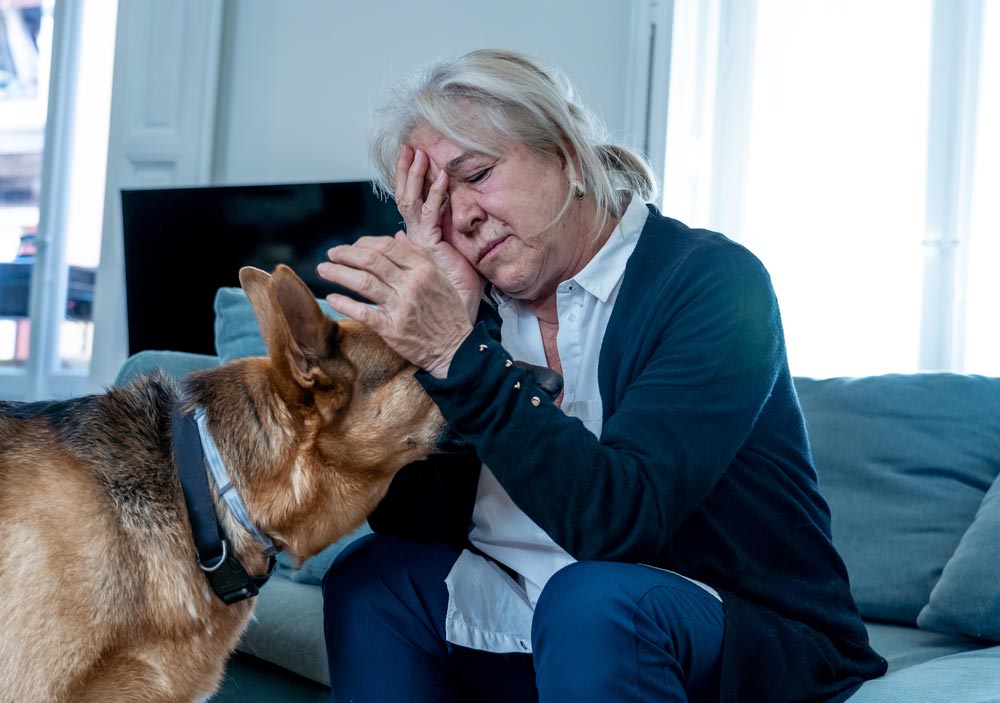
German Shepherds are often used as therapy dogs due to their intelligence, loyalty, and protective nature. They are gentle, patient, and have a calm disposition, making them well-suited for work with children and the elderly. German Shepherds are also highly trainable and eager to please, making them easy to work with and train for therapy work. Additionally, they have a strong protective instinct, which can provide a sense of security for people in therapy settings. Overall, German Shepherds are a fantastic breed for therapy work due to their friendly, loving, and calming presence. Learn more about German Shepherds.

Boxers are often used as therapy dogs due to their playful, energetic personalities and great sense of humor. They are patient, loyal, and protective of their owners, making them a great choice for therapy work. Boxers are also gentle and patient with children and the elderly, making them well-suited for work in hospitals, nursing homes, and other facilities. Additionally, Boxers are highly trainable and eager to please, which makes them easy to work with and train for therapy work. Overall, Boxers are a fantastic breed for therapy work due to their friendly, loving, and calming presence. Learn more about Boxers.
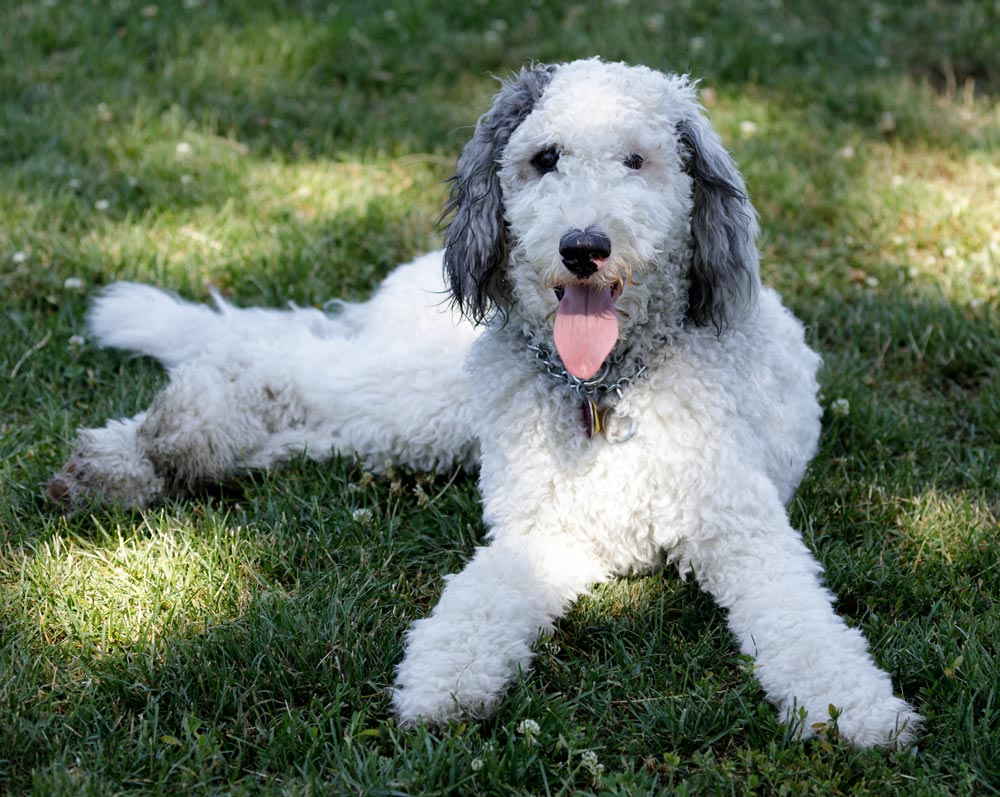
Bernedoodles are often used as therapy dogs due to their intelligence, gentle nature, and patient demeanor. This popular breed is a cross between a Bernese Mountain Dog and a Poodle and inherit many of the positive qualities of both breeds. Bernedoodles are highly social and love being around people, which makes them a great choice for visiting hospitals, nursing homes, and other facilities where they can provide comfort and companionship. They are also highly trainable and eager to please, making them easy to work with and train for therapy work. Additionally, Bernedoodles have a calm and patient disposition, which makes them well-suited for work with children and the elderly. Overall, Bernedoodles are a fantastic breed for therapy work due to their friendly, loving, and calming presence. Learn more about Standard Bernedoodles, and Mini Bernedoodles.
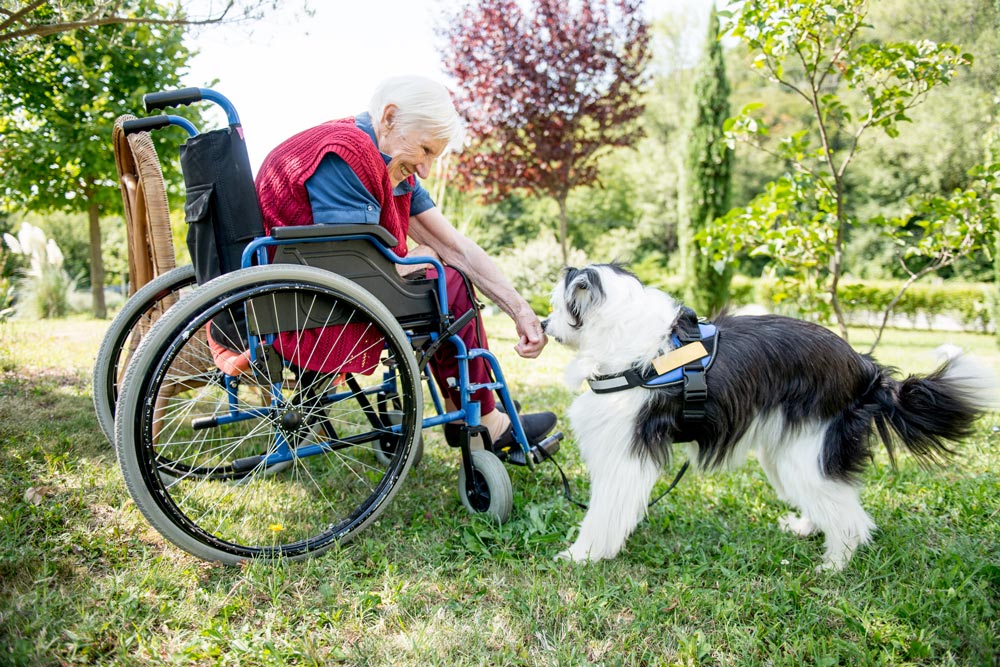
Border Collies are often used as therapy dogs due to their intelligence, energy, and trainability. They are gentle, patient and have a strong desire to please their owners, making them well-suited for therapy work. Border Collies are highly social and love being around people, which makes them a great choice for visiting hospitals, nursing homes, and other facilities where they can provide comfort and companionship. They are also highly trainable and eager to learn, which makes them easy to work with and train for therapy work. Additionally, Border Collies have a calm and patient disposition, which makes them well-suited for work with children and the elderly. Overall, Border Collies are a fantastic breed for therapy work due to their friendly, loving, and calming presence.
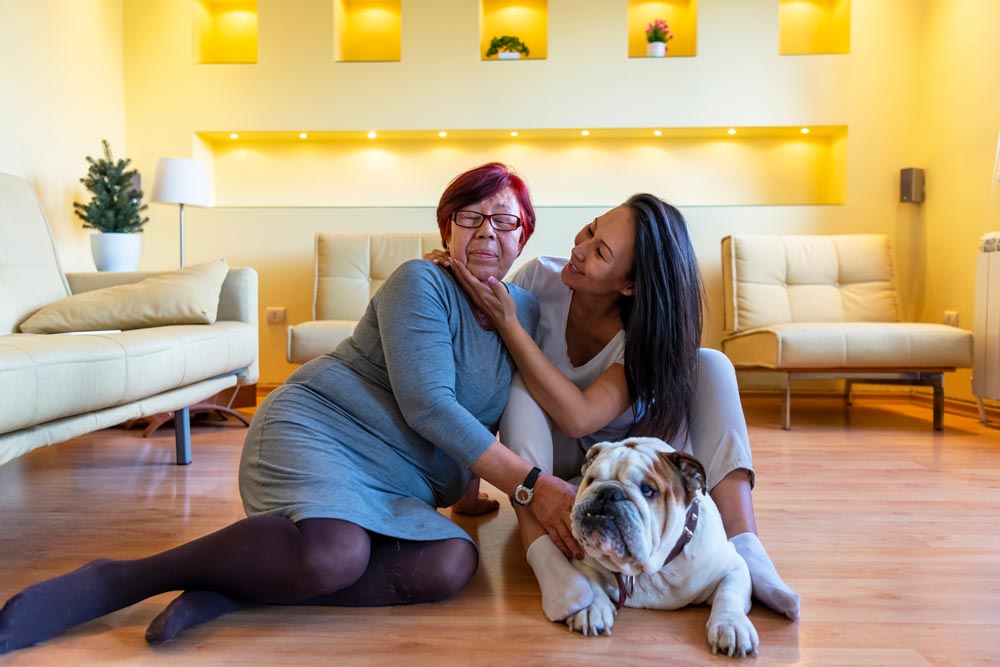
English Bulldogs are often used as therapy dogs due to their gentle, patient nature and calm disposition. This breed is loyal and protective of their owners, making them a great choice for therapy work. English Bulldogs are highly social and love being around people, which makes them a great choice for visiting hospitals, nursing homes, and other facilities where they can provide comfort and companionship. They are also relatively low-maintenance and do not require a lot of exercise, making them a good choice for therapy work in settings where space is limited. Overall, English Bulldogs are a fantastic breed for therapy work due to their friendly, loving, and calming presence. Learn more about English Bulldogs.

Bichon Frises are often used as therapy dogs due to their playful, charming personalities and great sense of humor. They are gentle, patient, and have a great disposition, making them well-suited for work with children and the elderly. Bichon Frises are highly social and love being around people, which makes them a great choice for visiting hospitals, nursing homes, and other facilities where they can provide comfort and companionship. They are also highly trainable and eager to please, making them easy to work with and train for therapy work. Additionally, Bichon Frises are relatively low-maintenance and do not require a lot of exercise, making them a good choice for therapy work in settings where space is limited. Overall, Bichon Frises are a fantastic breed for therapy work due to their friendly, loving, and calming presence. Learn more about Bichon Frise Dogs.
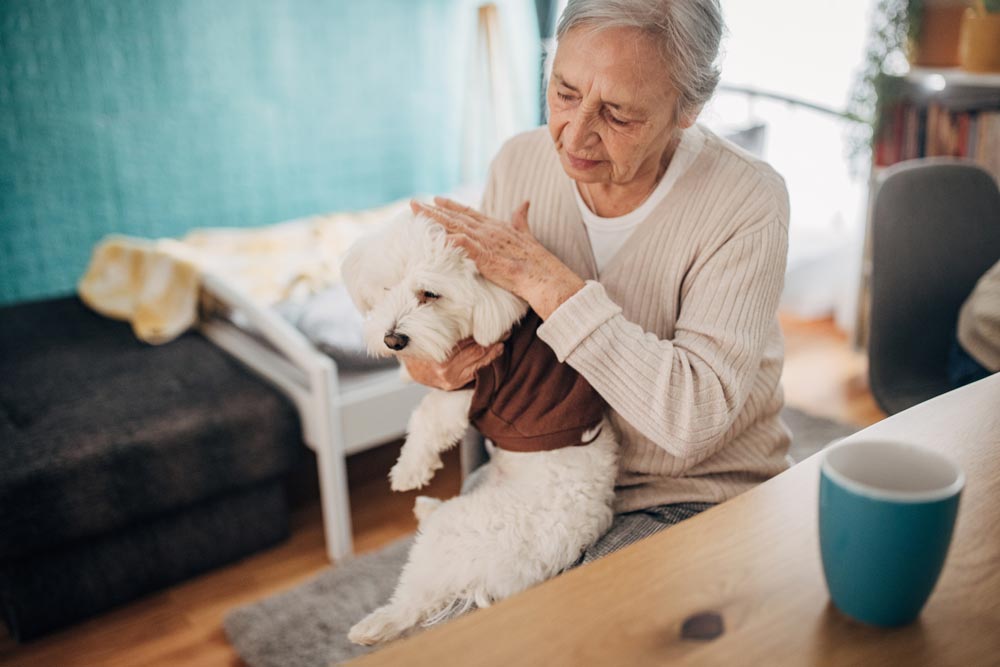
Maltese are often used as therapy dogs due to their playful, charming personalities and great sense of humor. They are gentle, patient, and have a great disposition, making them well-suited for work with children and the elderly. Maltese are highly social and love being around people, which makes them a great choice for visiting hospitals, nursing homes, and other facilities where they can provide comfort and companionship. They are also highly trainable and eager to please, making them easy to work with and train for therapy work. Additionally, Maltese are relatively low-maintenance and do not require a lot of exercise, making them a good choice for therapy work in settings where space is limited. Overall, Maltese are a fantastic breed for therapy work due to their friendly, loving, and calming presence. Learn more about Maltese Dogs.
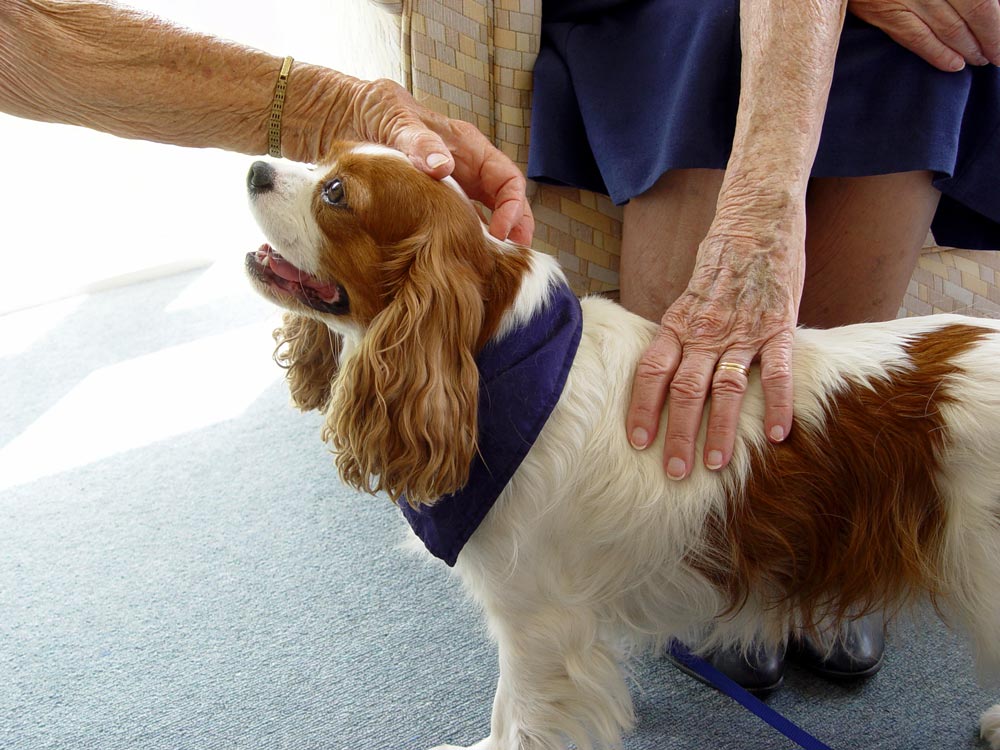
The Cavalier King Charles Spaniel breed is often used as therapy dogs due to their playful, charming personalities and great sense of humor. They are gentle, patient, and have a great disposition, making them well-suited for work with children and the elderly. Cavalier King Charles Spaniels are highly social and love being around people, which makes them a great choice for visiting hospitals, nursing homes, and other facilities where they can provide comfort and companionship. They are also highly trainable and eager to please, making them easy to work with and train for therapy work. Additionally, Cavalier King Charles Spaniels are relatively low-maintenance and do not require a lot of exercise, making them a good choice for therapy work in settings where space is limited. Overall, Cavalier King Charles Spaniels are a fantastic breed for therapy work due to their friendly, loving, and calming presence. Learn more about Cavalier Kind Charles Spaniels.

Beagles are often used as therapy dogs due to their intelligence, energy, and great sense of smell. They are gentle, patient, and have a calm disposition, making them well-suited for therapy work. Beagles are highly social and love being around people, which makes them a great choice for visiting hospitals, nursing homes, and other facilities where they can provide comfort and companionship. They are also highly trainable and eager to please, making them easy to work with and train for therapy work. Additionally, Beagles are relatively low-maintenance and do not require a lot of exercise, making them a good choice for therapy work in settings where space is limited. Overall, Beagles are a fantastic breed for therapy work due to their friendly, loving, and calming presence.
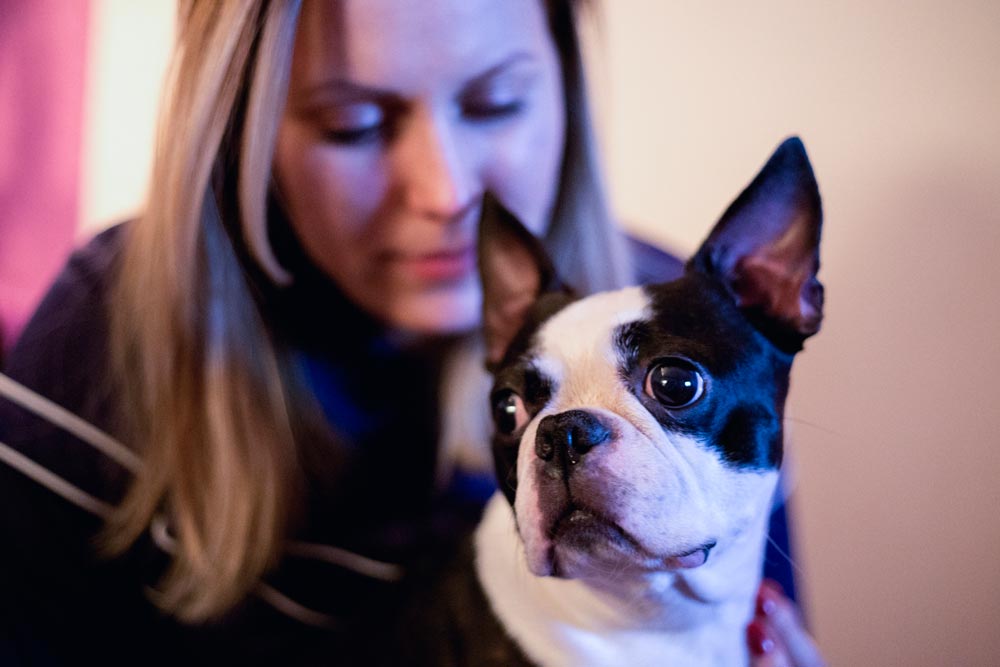
Boston Terriers are often used as therapy dogs due to their playful, charming personalities and great sense of humor. They are intelligent, loyal, and have a strong desire to please their owners, making them well-suited for therapy work. Boston Terriers are highly social and love being around people, which makes them a great choice for visiting hospitals, nursing homes, and other facilities where they can provide comfort and companionship. They are also highly trainable and eager to learn, which makes them easy to work with and train for therapy work. Additionally, Boston Terriers are relatively low-maintenance and do not require a lot of exercise, making them a good choice for therapy work in settings where space is limited. Overall, Boston Terriers are a fantastic breed for therapy work due to their friendly, loving, and calming presence. Learn more about Boston Terriers.

Cocker Spaniels are often used as therapy dogs due to their playful, charming personalities and great sense of humor. They are gentle, patient, and have a great disposition, making them well-suited for work with children and the elderly. Cocker Spaniels are highly social and love being around people, which makes them a great choice for visiting hospitals, nursing homes, and other facilities where they can provide comfort and companionship. They are also highly trainable and eager to please, making them easy to work with and train for therapy work. Additionally, Cocker Spaniels are relatively low-maintenance and do not require a lot of exercise, making them a good choice for therapy work in settings where space is limited. Overall, Cocker Spaniels are a fantastic breed for therapy work due to their friendly, loving, and calming presence. Learn more about Cocker Spaniels.
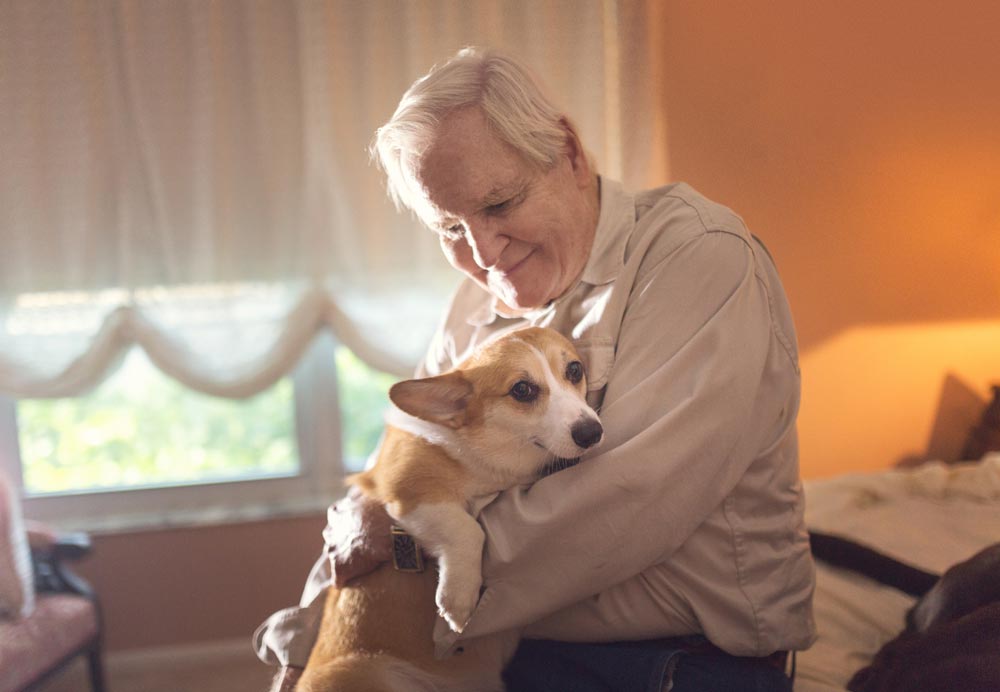
Welsh Corgis are often used as therapy dogs due to their playful, charming personalities and great sense of humor. They are intelligent, loyal, and have a strong desire to please their owners, making them well-suited for therapy work. Welsh Corgis are highly social and love being around people, which makes them a great choice for visiting hospitals, nursing homes, and other facilities where they can provide comfort and companionship. They are also highly trainable and eager to learn, which makes them easy to work with and train for therapy work. Additionally, Welsh Corgis are relatively low-maintenance and do not require a lot of physical exercise, making them a good choice for therapy work in settings where space is limited. Overall, Welsh Corgis are a fantastic breed for therapy work due to their friendly, loving, and calming presence. Learn more about Welsh Corgi Dogs.

Dachshunds can make excellent therapy dogs due to their small size, friendly nature, and affectionate disposition. They are known for being loyal and devoted to their owners, and they have a calm and gentle demeanor that makes them well-suited for therapy work. Dachshunds are also highly intelligent and easily trained, which makes them capable of learning the behaviors and commands necessary for therapy work. In addition, their small size allows them to easily visit people in hospitals, nursing homes, and other facilities, and their friendly and playful nature can help bring joy and comfort to those in need of therapeutic support. Learn more about Dachshunds and Miniature Dachshunds.
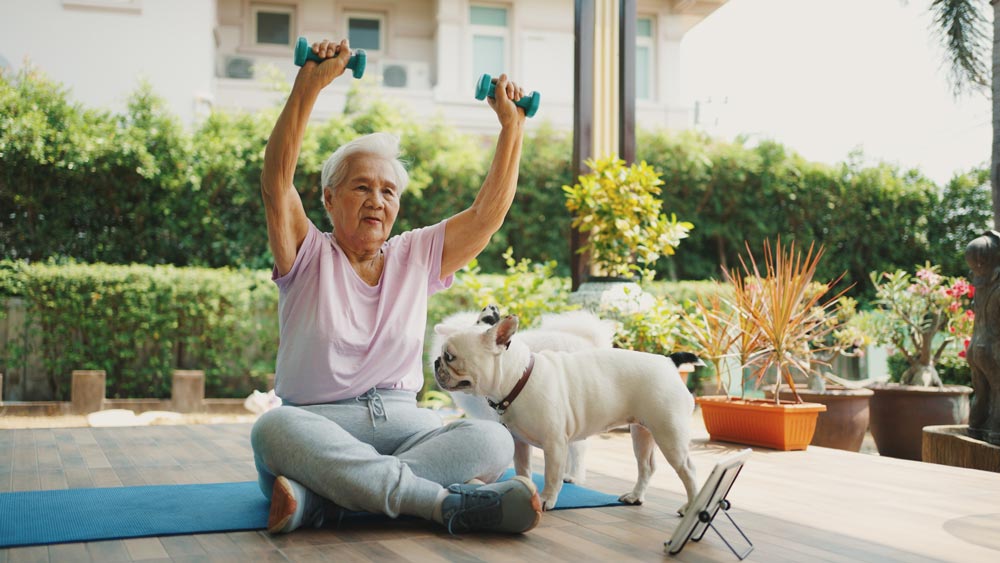
French Bulldogs can be good therapy dogs due to their friendly, patient, and gentle nature. This breed is also known for being good with children and the elderly, and they have a calm and easy-going temperament that makes them well-suited for therapy work. French Bulldogs are also highly intelligent and easily trained, which makes them capable of learning the behaviors and commands necessary for therapy work. In addition, their small size allows them to easily visit people in hospitals, nursing homes, and other facilities, and their playful and affectionate nature can help bring joy and comfort to those in need of therapeutic support. French Bulldogs are also generally easy to care for and have a low maintenance grooming requirement, which makes them well-suited for therapy work where the handler may have limited time or resources. Learn more about French Bulldogs.

Greyhounds can make excellent therapy dogs due to their gentle, affectionate, and patient nature. They are known for their calm disposition and ability to adapt to different environments, which makes them well-suited for therapy work. Greyhounds are also highly intelligent and easily trained, which allows them to learn the behaviors and commands necessary for therapy work. In addition, their slender and graceful build makes them well-suited for visiting people in hospitals, nursing homes, and other facilities, and their calm and gentle demeanor can help bring comfort and joy to those in need of therapeutic support. Greyhounds are also generally low-maintenance and easy to care for, which makes them an ideal choice for therapy work where the handler may have limited time or resources.

Havanese can be good therapy dogs due to their friendly, playful, and affectionate nature. Havanese dogs are known for being good with children and the elderly, and they have a calm and easy-going temperament that makes them well-suited for therapy work. Havanese are also highly intelligent and easily trained, which allows them to learn the behaviors and commands necessary for therapy work. In addition, their small size allows them to easily visit people in hospitals, nursing homes, and other facilities, and their playful and affectionate nature can help bring joy and comfort to those in need of therapeutic support. Havanese are also generally low-maintenance and easy to care for, which makes them an ideal choice for therapy work where the handler may have limited time or resources. Learn more about Havanese Dogs.

Irish Setters can make excellent therapy dogs due to their friendly, outgoing, and affectionate nature. This breed is known for being good with children and the elderly, and they have a calm and easy-going temperament that makes them well-suited for therapy work. Irish Setters are also highly intelligent and easily trained, which allows them to learn the behaviors and commands necessary for therapy work. In addition, their medium size allows them to easily visit people in hospitals, nursing homes, and other facilities, and their playful and affectionate nature can help bring joy and comfort to those in need of therapeutic support. Irish Setters are also generally low-maintenance and easy to care for, which makes them an ideal choice for therapy work where the handler may have limited time or resources.

Chihuahuas can be good therapy dogs due to their small size, friendly nature, and affectionate disposition. They are known for being loyal and devoted to their owners, and they have a calm and gentle demeanor that makes them well-suited for therapy work. Chihuahuas are also highly intelligent and easily trained, which makes them capable of learning the behaviors and commands necessary for therapy work. In addition, their small size allows them to easily visit people in hospitals, nursing homes, and other facilities, and their friendly and playful nature can help bring joy and comfort to those in need of therapeutic support. Chihuahuas are also generally low-maintenance and easy to care for, which makes them an ideal choice for therapy work where the handler may have limited time or resources. Learn more about Chihuahuas.
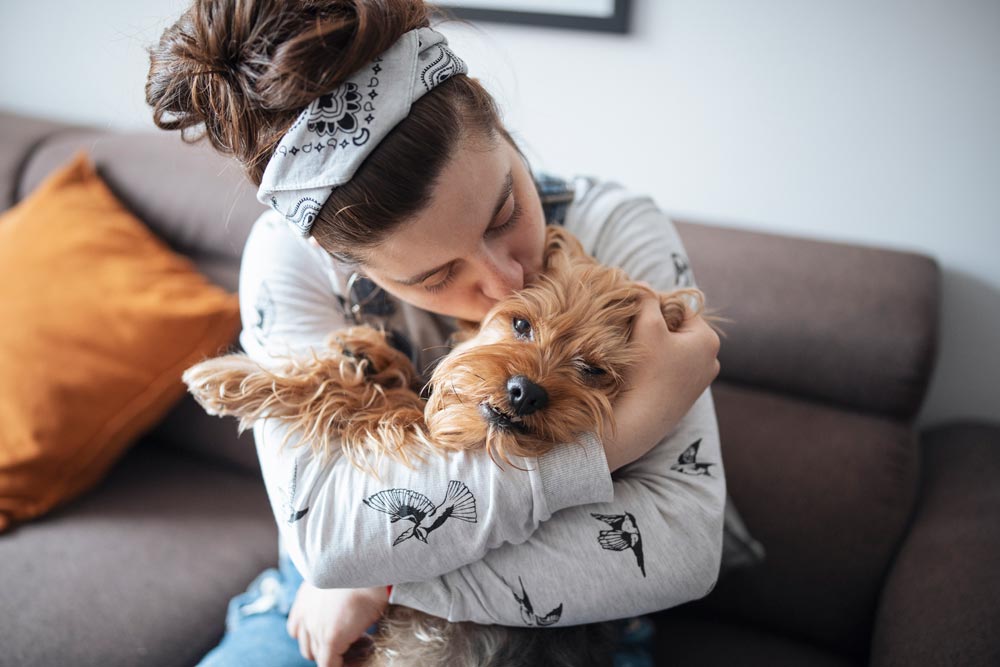
Yorkshire Terriers can be good therapy dogs due to their small size, friendly nature, and affectionate disposition. They are known for being loyal and devoted to their owners, and they have a calm and gentle demeanor that makes them well-suited for therapy work. Yorkshire Terriers are also highly intelligent and easily trained, which makes them capable of learning the behaviors and commands necessary for therapy work. In addition, their small size allows them to easily visit people in hospitals, nursing homes, and other facilities, and their friendly and playful nature can help bring joy and comfort to those in need of therapeutic support. Yorkshire Terriers are also generally low-maintenance and easy to care for, which makes them an ideal choice for therapy work where the handler may have limited time or resources. Learn more about Yorkshire Terriers.
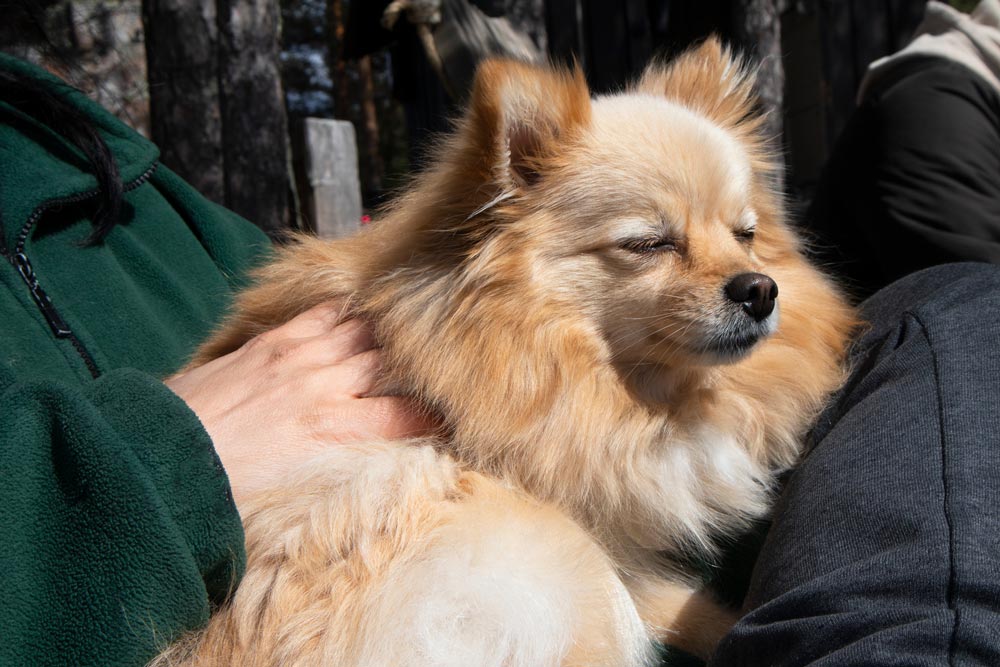
Pomeranians can be good therapy dogs due to their small size, friendly nature, and affectionate disposition. They are known for being loyal and devoted to their owners, and they have a calm and gentle demeanor that makes them well-suited for therapy work. Pomeranians are also highly intelligent and easily trained, which makes them capable of learning the behaviors and commands necessary for therapy work. In addition, their small size allows them to easily visit people in hospitals, nursing homes, and other facilities, and their friendly and playful nature can help bring joy and comfort to those in need of therapeutic support. Pomeranians are also generally low-maintenance and easy to care for, which makes them an ideal choice for therapy work where the handler may have limited time or resources. Learn more about Pomeranians.
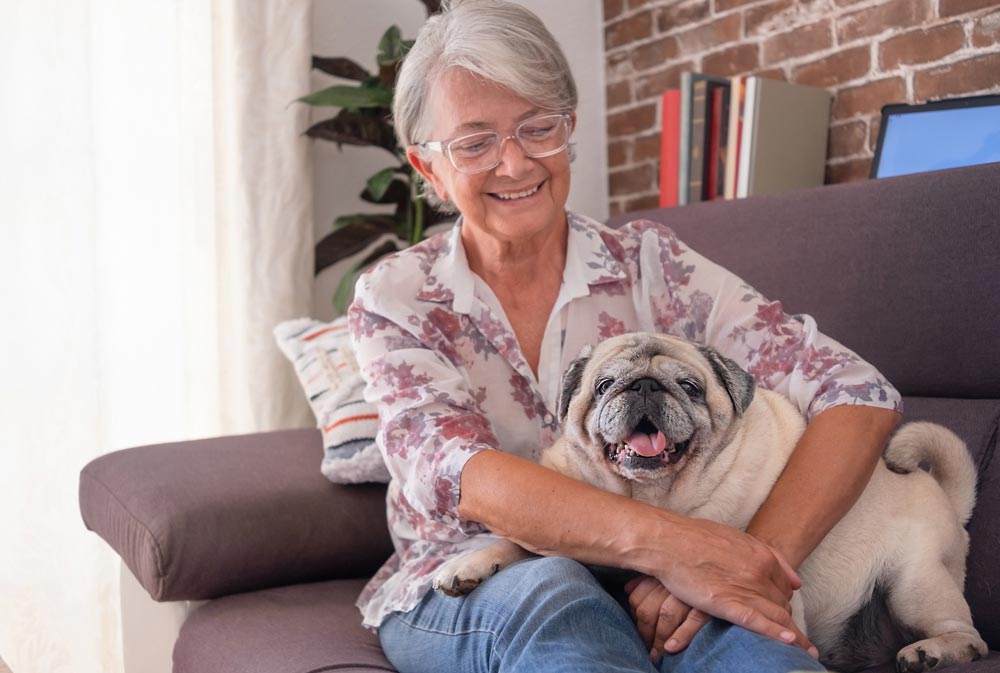
Pugs can be good therapy dogs due to their friendly, playful, and affectionate nature. This breed is also known for being good with children and the elderly, and they have a calm and easy-going temperament that makes them well-suited for therapy work. Pugs are also highly intelligent and easily trained, which allows them to learn the behaviors and commands necessary for therapy work. In addition, their small size allows them to easily visit people in hospitals, nursing homes, and other facilities, and their playful and affectionate nature can help bring joy and comfort to those in need of therapeutic support. Pugs are also generally low-maintenance and easy to care for, which makes them an ideal choice for therapy work where the handler may have limited time or resources.
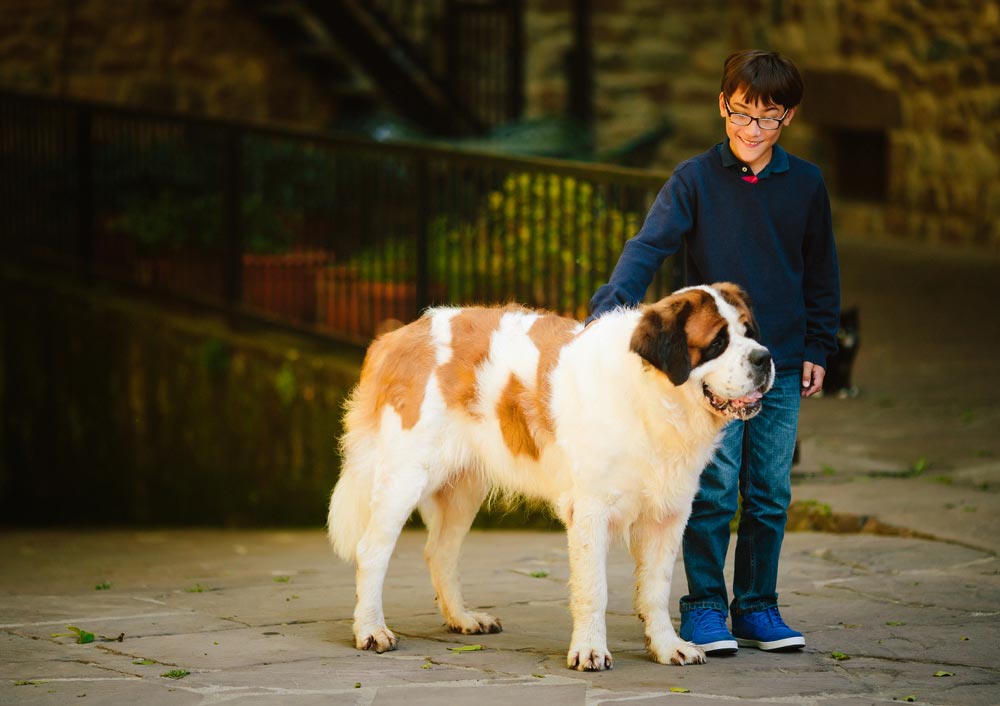
Saint Bernards can be good therapy dogs due to their friendly, gentle, and affectionate nature. This breed is also known for being good with children and the elderly, and they have a calm and easy-going temperament that makes them well-suited for therapy work. Saint Bernards are also highly intelligent and easily trained, which allows them to learn the behaviors and commands necessary for therapy work. In addition, their large size allows them to easily visit people in hospitals, nursing homes, and other facilities, and their calm and gentle demeanor can help bring comfort and joy to those in need of therapeutic support. Saint Bernards are also generally low-maintenance and easy to care for, which makes them an ideal choice for therapy work where the handler may have limited time or resources.
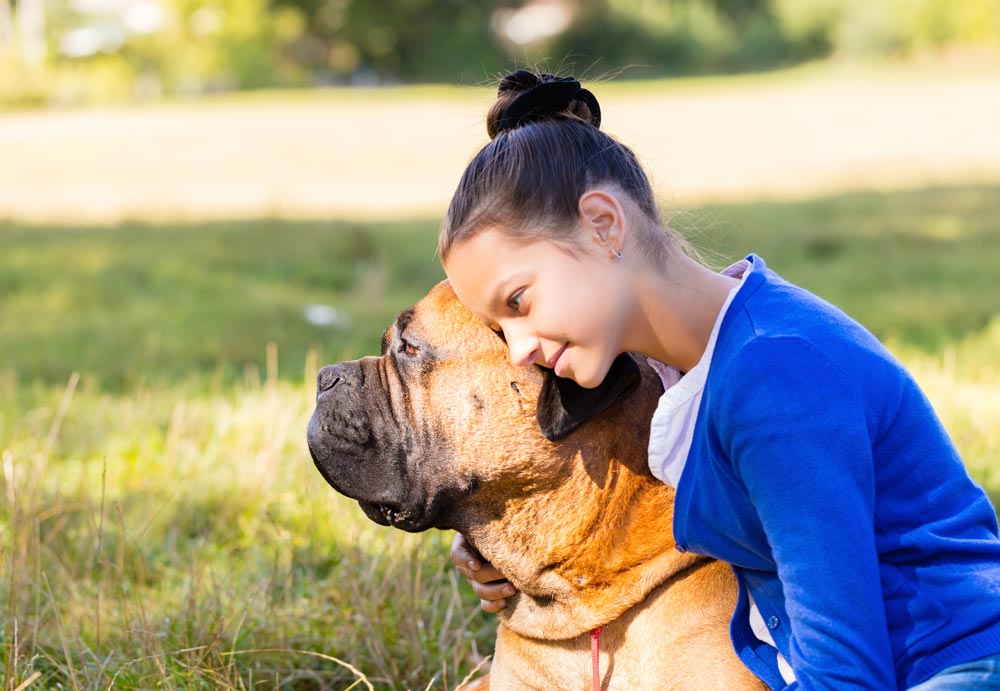
Bull Mastiffs can be good therapy dogs due to their gentle, affectionate, and patient nature. They are known for their calm disposition and ability to adapt to different environments, which makes them well-suited for therapy work. Bull Mastiffs are also highly intelligent and easily trained, which allows them to learn the behaviors and commands necessary for therapy work. In addition, their large size allows them to easily visit people in hospitals, nursing homes, and other facilities, and their calm and gentle demeanor can help bring comfort and joy to those in need of therapeutic support. Bull Mastiffs are also generally low-maintenance and easy to care for, which makes them an ideal choice for therapy work where the handler may have limited time or resources.

Dalmatians can be good therapy dogs due to their friendly, playful, and affectionate nature. This breed is also known for being good with children and the elderly, and they have a calm and easy-going temperament that makes them well-suited for therapy work. Dalmatians are also highly intelligent and easily trained, which allows them to learn the behaviors and commands necessary for therapy work. In addition, their medium size allows them to easily visit people in hospitals, nursing homes, and other facilities, and their playful and affectionate nature can help bring joy and comfort to those in need of therapeutic support. Dalmatians are also generally low-maintenance and easy to care for, which makes them an ideal choice for therapy work where the handler may have limited time or resources.
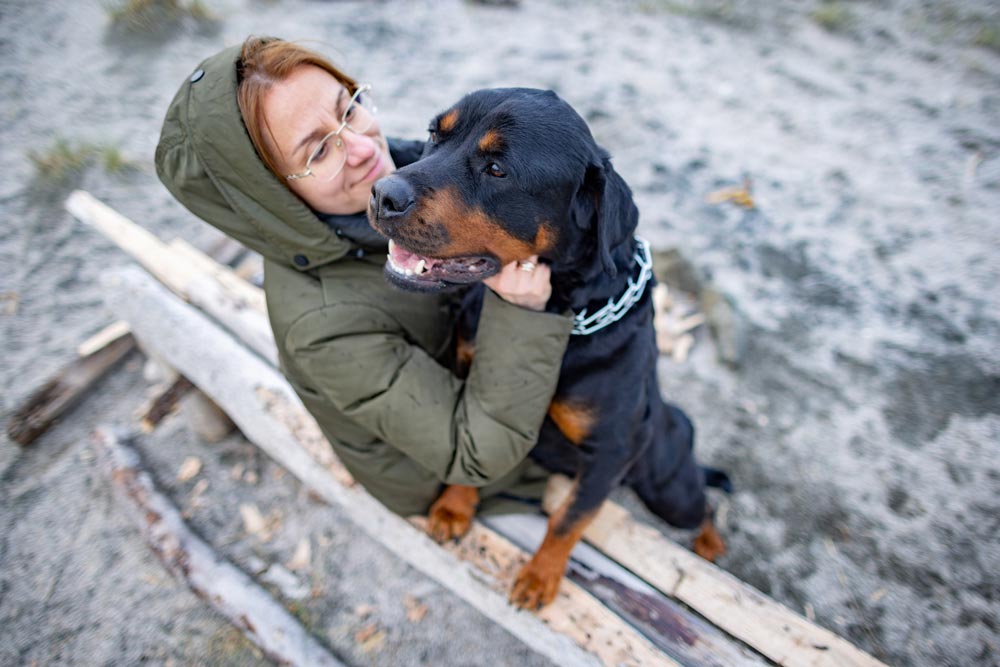
Rottweilers can be good therapy dogs due to their gentle, affectionate, and patient nature. They are known for their calm disposition and ability to adapt to different environments, which makes them well-suited for therapy work. Rottweilers are also highly intelligent and easily trained, which allows them to learn the behaviors and commands necessary for therapy work. In addition, their large size allows them to easily visit people in hospitals, nursing homes, and other facilities, and their calm and gentle demeanor can help bring comfort and joy to those in need of therapeutic support. Rottweilers are also generally low-maintenance and easy to care for, which makes them an ideal choice for therapy work where the handler may have limited time or resources. Learn more about Rottweilers.

Shetland Sheepdogs can be good therapy dogs due to their friendly, gentle, and affectionate nature. Shelties are known for being good with children and the elderly, and they have a calm and easy-going temperament that makes them well-suited for therapy work. Shetland Sheepdogs are also highly intelligent and easily trained, which allows them to learn the behaviors and commands necessary for therapy work. In addition, their medium size allows them to easily visit people in hospitals, nursing homes, and other facilities, and their calm and gentle demeanor can help bring comfort and joy to those in need of therapeutic support. Shetland Sheepdogs are also generally low-maintenance and easy to care for, which makes them an ideal choice for therapy work where the handler may have limited time or resources.
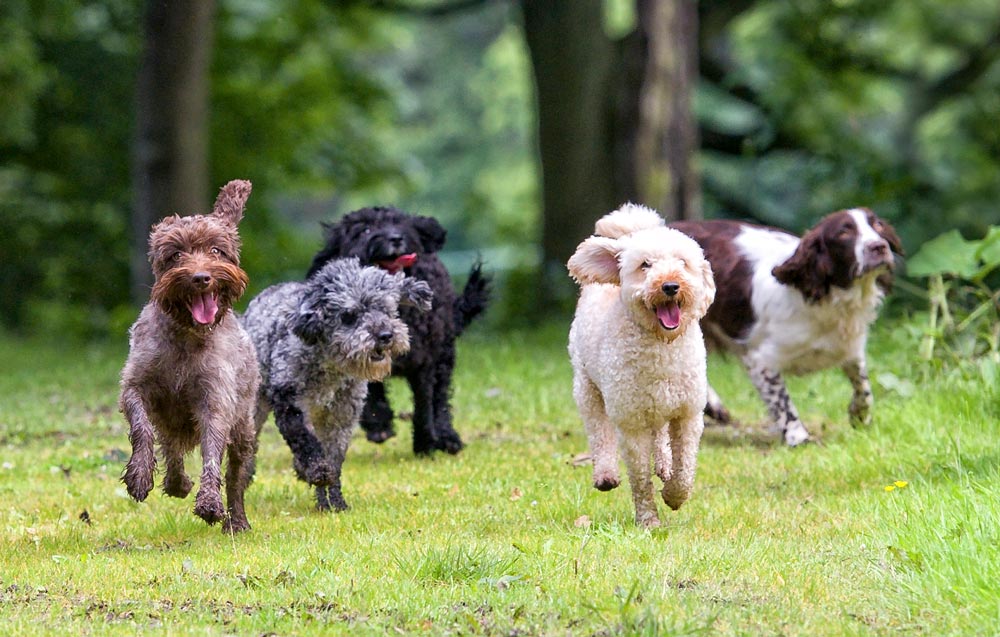
There are many types of Doodle breeds that can be good therapy dogs, including Labradoodles, Goldendoodles, and Bernedoodles, among others. Doodle breeds are known for their friendly, gentle, and affectionate nature, and they have a calm and easy-going temperament that makes them well-suited for therapy work. Doodle breeds are also highly intelligent and easily trained, which allows them to learn the behaviors and commands necessary for therapy work. In addition, their medium to large size allows them to easily visit people in hospitals, nursing homes, and other facilities, and their calm and gentle demeanor can help bring comfort and joy to those in need of therapeutic support. Doodle breeds are also generally low-maintenance and easy to care for, which makes them an ideal choice for therapy work where the handler may have limited time or resources.
In conclusion, therapy dogs are specially trained to provide comfort, support, and companionship to individuals who may be experiencing physical, mental, or emotional challenges. There are many different types of therapy dogs, including facility therapy dogs, professional therapy dogs, education therapy dogs, service therapy dogs, and crisis response therapy dogs, and they can provide a wide range of services to individuals in need. Therapy dogs can be any breed, but they typically have a calm, friendly, and affectionate disposition, and they are well-trained and socialized to work with people. Therapy dogs can provide numerous benefits to individuals, including reducing anxiety and stress, improving physical and mental health, and enhancing socialization and communication skills. Overall, therapy dogs can be an invaluable source of comfort, support, and companionship to those in need. Learn more about Aussiedoodles, Mini Aussiedoodles, Standard Labradoodles, Mini Labradoodles, Irish Doodles, Saint Berdoodles, and Sheepadoodles.
© 2025 by Trusted Puppies, LLC
Designed & Built By USA web & SEO